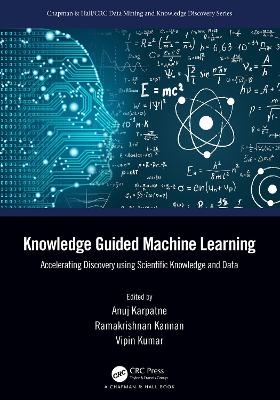
Knowledge Guided Machine Learning
Chapman & Hall/CRC (Verlag)
978-0-367-69820-1 (ISBN)
Given their tremendous success in commercial applications, machine learning (ML) models are increasingly being considered as alternatives to science-based models in many disciplines. Yet, these "black-box" ML models have found limited success due to their inability to work well in the presence of limited training data and generalize to unseen scenarios. As a result, there is a growing interest in the scientific community on creating a new generation of methods that integrate scientific knowledge in ML frameworks. This emerging field, called scientific knowledge-guided ML (KGML), seeks a distinct departure from existing "data-only" or "scientific knowledge-only" methods to use knowledge and data at an equal footing. Indeed, KGML involves diverse scientific and ML communities, where researchers and practitioners from various backgrounds and application domains are continually adding richness to the problem formulations and research methods in this emerging field.
Knowledge Guided Machine Learning: Accelerating Discovery using Scientific Knowledge and Data provides an introduction to this rapidly growing field by discussing some of the common themes of research in KGML using illustrative examples, case studies, and reviews from diverse application domains and research communities as book chapters by leading researchers.
KEY FEATURES
First-of-its-kind book in an emerging area of research that is gaining widespread attention in the scientific and data science fields
Accessible to a broad audience in data science and scientific and engineering fields
Provides a coherent organizational structure to the problem formulations and research methods in the emerging field of KGML using illustrative examples from diverse application domains
Contains chapters by leading researchers, which illustrate the cutting-edge research trends, opportunities, and challenges in KGML research from multiple perspectives
Enables cross-pollination of KGML problem formulations and research methods across disciplines
Highlights critical gaps that require further investigation by the broader community of researchers and practitioners to realize the full potential of KGML
Anuj Karpatne is an Assistant Professor in the Department of Computer Science at Virginia Tech. His research focuses on pushing on the frontiers of knowledge-guided machine learning by combining scientific knowledge and data in the design and learning of machine learning methods to solve scientific and societally relevant problems. Ramakrishnan Kannan is the group leader for Discrete Algorithms at Oak Ridge National Laboratory. His research expertise is in distributed machine learning and graph algorithms on HPC platforms and their application to scientific data with a specific interest for accelerating scientific discovery. Vipin Kumar is a Regents Professor at the University of Minnesota’s Computer Science and Engineering Department. His current major research focus is on knowledge-guided machine learning and its applications to understanding the impact of human induced changes on the Earth and its environment.
About the Editors. List of Contributors. 1 Introduction. 2 Targeted Use of Deep Learning for Physics and Engineering. 3 Combining Theory and Data-Driven Approaches for Epidemic Forecasts. 4 Machine Learning and Projection-Based Model Reduction in Hydrology and Geosciences. 5 Applications of Physics-Informed Scientific Machine Learning in Subsurface Science: A Survey. 6 Adaptive Training Strategies for Physics-Informed Neural Networks. 7 Modern Deep Learning for Modeling Physical Systems. 8 Physics-Guided Deep Learning for Spatiotemporal Forecasting. 9 Science-Guided Design and Evaluation of Machine Learning Models: A Case-Study on Multi-Phase Flows. 10 Using the Physics of Electron Beam Interactions to Determine Optimal Sampling and Image Reconstruction Strategies for High Resolution STEM. 11 FUNNL: Fast Nonlinear Nonnegative Unmixing for Alternate Energy Systems. 12 Structure Prediction from Scattering Profiles: A Neutron-Scattering Use-Case. 13 Physics-Infused Learning: A DNN and GAN Approach. 14 Combining System Modeling and Machine Learning into Hybrid Ecosystem Modeling. 15 Physics-Guided Neural Networks (PGNN): An Application in Lake Temperature Modeling. 16 Physics-Guided Recurrent Neural Networks for Predicting Lake Water Temperature. 17 Physics-Guided Architecture (PGA) of LSTM Models for Uncertainty Quantification in Lake Temperature Modeling, Index.
| Erscheinungsdatum | 05.07.2022 |
|---|---|
| Reihe/Serie | Chapman & Hall/CRC Data Mining and Knowledge Discovery Series |
| Zusatzinfo | 38 Tables, black and white; 170 Line drawings, color; 7 Line drawings, black and white; 1 Halftones, color; 170 Illustrations, color; 8 Illustrations, black and white |
| Sprache | englisch |
| Maße | 178 x 254 mm |
| Gewicht | 820 g |
| Themenwelt | Informatik ► Software Entwicklung ► Spieleprogrammierung |
| Mathematik / Informatik ► Informatik ► Theorie / Studium | |
| Wirtschaft ► Volkswirtschaftslehre ► Ökonometrie | |
| ISBN-10 | 0-367-69820-X / 036769820X |
| ISBN-13 | 978-0-367-69820-1 / 9780367698201 |
| Zustand | Neuware |
| Haben Sie eine Frage zum Produkt? |
aus dem Bereich


